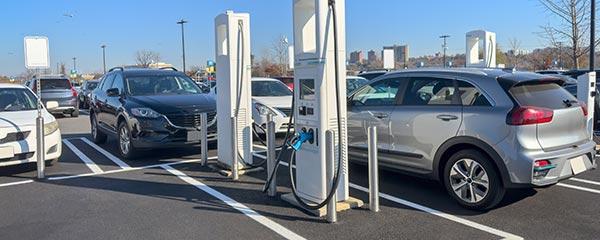WASHINGTON, D.C. -- Environmental crises in the U.S. -- including extreme weather events like hurricanes and heat waves, or contamination of air and water -- affect millions of Americans each year, and a majority (62%) of Americans report experiencing some kind of environmental crisis in the past five years.
New analyses from Gallup’s Center on Black Voices indicate that these crises can have critical -- and lasting -- effects on Americans’ mental health and quality of life.
���۴�ýhas previously found that Black and Hispanic Americans are more vulnerable than White Americans to crises resulting from extreme weather and natural disasters and harbor greater concerns about current exposure to pollution and environmental contamination.
Environmental Crises Linked to Lasting Negative Wellbeing
Americans who report experiencing at least one environmental crisis sometime in the past five years are less likely to be "thriving" overall in their lives currently (47%) compared with those who have not experienced such crises (54%).
Environmental disaster can compound economic struggles, and wellbeing effects are disproportionately observed among lower- and middle-income Americans. Among U.S. adults living in households earning less than $60,000 per year, those who have experienced at least one environmental crisis (29%) are less likely to be thriving compared with those who have not experienced such crises (37%). Similarly, among Americans in households earning between $60,000 and $119,999, those who have experienced an environmental crisis (49%) are less likely to be thriving than those who have not (59%).
Only in the highest household income group of $120,000 or more does the cumulative impact of environmental crises on wellbeing dissipate.
Americans who have experienced one or more environmental crises in the past five years are also more likely to report having felt negative emotions “a lot” of the prior day compared with those who have not experienced such crises.
Reports of stress and anxiety are each 13 percentage points higher among those who have experienced an environmental crisis than among those who have not. Self-reported sadness and anger are also significantly higher among those who have endured environmental crises.
In the years after living through an environmental crisis, Americans are more likely to report anhedonia, the feeling of experiencing little interest or pleasure in doing things, which is a common symptom of depression. More than half of Americans who have experienced at least one environmental crisis in the past five years (56%) report feeling this way sometimes or nearly every day, a rate that is 12 points higher than among those who have not experienced an environmental crisis in this time period.
Relocating Due to Environmental Crisis Associated With Greater Negative Emotions
The safety and physical health hazards posed by environmental crises often compel families to relocate, either temporarily or permanently, in response to immediate threats or ongoing conditions. These relocations -- whether voluntary or through mandated evacuations -- can be major disruptions to people’s lives.
As of August 2023, 9% of U.S. adults reported having had to relocate in the previous 12 months because of pollution or environmental contamination (3% permanently and 6% temporarily), and 10% of U.S adults reported having had to do so because of extreme weather or natural disasters (5% permanently and 5% temporarily). In a separate analysis of these data, Black Americans were more likely to report relocating for either reason (pollution/contamination or weather/natural disaster).
Temporary relocation appears to have the greatest impact on wellbeing. The data show that life satisfaction is considerably lower among Americans who have had to relocate temporarily because of environmental crises in the past 12 months, while the effect is less negative on the wellbeing of those who have had to move permanently.
About half of Americans who have not had to relocate are thriving, a proportion that drops to 35% among those who have moved temporarily because of extreme weather or natural disasters and 30% among those who have done so because of harmful pollution or contamination.
Americans who say they have had to relocate either permanently or temporarily because of environmental crises sometime in the past 12 months are also more likely to report that they experienced stress, worry or anxiety a lot of the previous day, compared with those who have not had to relocate. Notably, 56% of respondents who say they had to relocate temporarily reported experiencing anxiety a lot of the day, and 51% who say they had to relocate permanently reported the same. Among those who did not relocate at all, only 38% reported experiencing anxiety a lot of the day.
Rates of those experiencing loneliness a lot of the previous day are elevated among those who have had to relocate because of environmental crises. Twenty-two percent of Americans who have not relocated reported feeling lonely a lot of the day, but rates are approximately 20 points higher among those who have relocated. Among those who relocated because of extreme weather or natural disasters, rates of loneliness are 41% among those who relocated permanently and 43% who relocated temporarily, and among those who relocated because of pollution or contamination, rates of loneliness are 38% among those who relocated permanently and 46% among those who relocated temporarily.
Compared with those who did not relocate at all, reports of negative emotions are particularly elevated among those who have had to relocate temporarily. For example, nearly two-thirds of those who relocated temporarily say they experienced stress a lot of the previous day, compared with just 48% for those who did not relocate. Similarly, rates of experiencing loneliness the previous day are twice as high among those who relocated temporarily compared with those who did not relocate at all.
While less than half of Americans who have not relocated in the past 12 months indicate that they are experiencing anhedonia sometimes or nearly every day, approximately three-quarters of Americans who have had to relocate because of environmental crises report having feelings of diminished pleasure and joy sometimes or nearly every day over the past two weeks.
Implications
The emotional toll of environmental crises extends well beyond the immediate aftermath of disasters. Persistent worry and anxiety can linger long afterward, compounded by the potential financial strain of recovery, rebuilding or relocating. These ongoing stressors underscore the enduring impact on individuals' mental health and quality of life, emphasizing the need for holistic approaches to environmental sustainability and resilience.
Although environmental crises pose a significant threat to the mental health and wellbeing of all who experience them, lower-income groups are more likely to be impacted by these crises and are less likely to have the resources to cope with and recover from their effects. Previous ���۴�ýresearch has also found that people of color are not as prepared for environmental disasters as White Americans and are more likely to experience certain types of crises.
As business leaders, investors and policymakers navigate strategies for environmental sustainability, understanding the impact of environmental factors on wellbeing becomes a critical metric for measuring progress. Addressing these disparities requires equitable access to resources, proactive disaster preparedness, and community-based resilience initiatives aimed at fostering sustainable and inclusive outcomes.
Visit Gallup’s Center on Black Voices to stay up to date with the latest insights from Black Americans.
To stay up to date with the latest ���۴�ýNews insights and updates, follow us on X .
Learn more about how the works.




